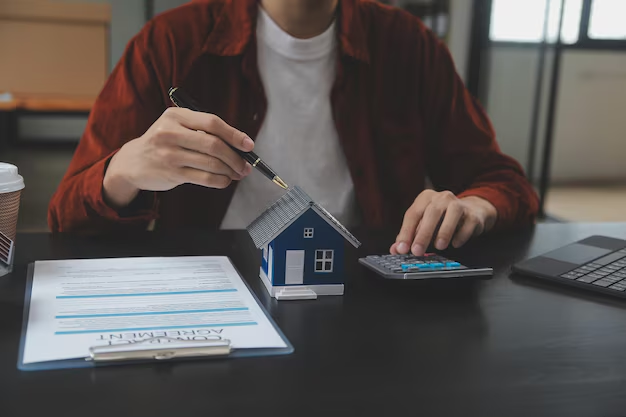Your Guide to How To Calculate Capital Gains Tax On Home Sale
What You Get:
Free Guide
Free, helpful information about Capital Gains Tax FAQ and related How To Calculate Capital Gains Tax On Home Sale topics.
Helpful Information
Get clear and easy-to-understand details about How To Calculate Capital Gains Tax On Home Sale topics and resources.
Personalized Offers
Answer a few optional questions to receive offers or information related to Capital Gains Tax FAQ. The survey is optional and not required to access your free guide.
Navigating Capital Gains Tax on Home Sales: Your Complete Guide
Selling your home is a significant milestone, often marking a new chapter in life. However, it's crucial to navigate the intricacies of capital gains tax, which can eat into your profits if not handled wisely. Here, we demystify how to calculate capital gains tax when selling your home, ensuring you have the knowledge to minimize your tax liability and maximize your returns.
Understanding Capital Gains Tax
What is Capital Gains Tax?
Capital gains tax is levied on the profit you earn from selling an asset that has increased in value. When it comes to real estate, this tax is relevant if your home has appreciated in value since you purchased it.
When Does It Apply?
Primarily, capital gains tax applies if the sale price of your home exceeds its purchase price. However, exemptions exist, especially for primary residences, which can save you substantially if you meet specific criteria.
Calculating Capital Gains
Here's a closer look at the steps involved in calculating capital gains:
1. Determine Your Cost Basis
The cost basis is the original value of the property. This includes the purchase price and other associated costs such as:
- Closing Costs: Legal fees, title insurance, etc.
- Home Improvements: Only those that add substantial value, like kitchen remodels or adding an extra room.
2. Calculate the Sale Price
The sale price includes the total money received from the buyer for the property. Don't forget to subtract any selling expenses such as realtor commissions and closing fees.
3. Compute the Capital Gains
To find your capital gains, use the formula:
[ ext{Capital Gains} = ext{Sale Price} - ext{Cost Basis} ]
Example:
- Purchase Price: $300,000
- Improvements: $20,000
- Cost Basis: $320,000 (Purchase Price + Improvements)
- Sale Price: $500,000
- Capital Gains: $500,000 - $320,000 = $180,000
Tax Implications on Capital Gains
Short-Term vs. Long-Term Gains
- Short-Term Gains: If you owned the home for less than a year, gains are taxed as ordinary income.
- Long-Term Gains: For more than a year, a lower, long-term capital gains tax rate applies, which is beneficial.
Exemptions for Primary Residences
If the home sold was your primary residence, you might qualify for a home sale exclusion:
- Single Filers: Exempt up to $250,000
- Married Couples Filing Jointly: Exempt up to $500,000
Eligibility for Exemptions
To qualify, the following must be true:
- You owned the home for at least two of the last five years.
- You used the home as your primary residence for at least two of the last five years.
- You haven't used the exclusion for another home in the last two years.
Special Considerations and Strategies
Home Improvements and Your Cost Basis
Increasing your cost basis with documented improvements can significantly reduce your capital gains. Keep meticulous records of all improvements to ensure you get the full benefit.
Time Your Sale Strategically
Consider selling in a year when you don't have significant other income, or stagger your sales to prevent excessive taxation.
Rental Properties and Second Homes
- Rental Properties: Differ from primary residences in tax benefits. You may have to pay more due to depreciation recapture.
- Second Homes: Generally do not qualify for the primary residence exemption unless you've lived in them for a sufficient period.
Practical Steps and Key Takeaways 📋
Quick Tips
- 👉 Document Everything: Keep records of purchase dates, improvements, and sales documentation.
- 👉 Understand Exemptions: Make sure you qualify for exemptions to avoid unnecessary tax.
- 👉 Plan Sales Wisely: Consider timing and strategies that reduce the tax burden.
- 👉 Consult Professionals: Always seek professional advice for complex situations.
Wrapping Up: Navigating Legal Complexities
Selling a home involves more than listing and marketing; the financial intricacies can have long-lasting impacts. By understanding how capital gains tax works for home sales, you empower yourself to make informed decisions that safeguard your financial future.
Remember, each situation is unique. Therefore, tailor these general guidelines to your circumstances, and consider consulting with tax or real estate professionals for personalized advice that aligns with your goals.
Through structured planning and an informed approach, you can confidently navigate the nuances of capital gains tax on home sales, maximizing your benefits and minimizing potential downsides.
What You Get:
Free Capital Gains Tax FAQ Guide
Free, helpful information about How To Calculate Capital Gains Tax On Home Sale and related resources.

Helpful Information
Get clear, easy-to-understand details about How To Calculate Capital Gains Tax On Home Sale topics.

Optional Personalized Offers
Answer a few optional questions to see offers or information related to Capital Gains Tax FAQ. Participation is not required to get your free guide.


Discover More
- Do Capital Gains Affect Tax Bracket
- Do I Have To Pay Capital Gains Tax
- Do I Have To Pay Capital Gains Tax Immediately
- Do You Pay State Tax On Capital Gains
- Does Florida Have Capital Gains Tax
- Does Kamala Harris Want To Tax Unrealized Capital Gains
- Does Texas Have Capital Gains Tax
- Does Wyoming Tax Capital Gains
- How Avoid Capital Gains Tax
- How Can I Avoid Paying Capital Gains Tax
